- Home
- Peter Høeg
The Susan Effect
The Susan Effect Read online
CONTENTS
Cover
About the Book
About the Author
Also by Peter Høeg
Title Page
Part One
Chapter 1
Chapter 2
Chapter 3
Chapter 4
Chapter 5
Chapter 6
Chapter 7
Chapter 8
Chapter 9
Chapter 10
Chapter 11
Chapter 12
Chapter 13
Chapter 14
Chapter 15
Chapter 16
Chapter 17
Chapter 18
Chapter 19
Chapter 20
Chapter 21
Chapter 22
Chapter 23
Chapter 24
Chapter 25
Chapter 26
Chapter 27
Chapter 28
Chapter 29
Chapter 30
Chapter 31
Chapter 32
Chapter 33
Chapter 34
Chapter 35
Chapter 36
Chapter 37
Chapter 38
Part Two
Chapter 1
Chapter 2
Chapter 3
Chapter 4
Chapter 5
Chapter 6
Chapter 7
Chapter 8
Chapter 9
Chapter 10
Part Three
Chapter 1
Chapter 2
Chapter 3
Chapter 4
Chapter 5
Chapter 6
Chapter 7
Chapter 8
Chapter 9
Chapter 10
Chapter 11
Copyright
ABOUT THE BOOK
SUSAN SVENDSEN HAS AN UNUSUAL TALENT. She is an expert in finding out secrets. People feel oddly compelled to confide in her and unwittingly confess their innermost thoughts. Her whole life, she has exploited this talent, but now her family is in jeopardy and there is a prison sentence hanging over her head.
Then Susan gets a timely offer from a former government official: use her power one more time and have all charges dropped. To get her life back in order, she must track down the last surviving members of a secret think tank, the Future Committee, and find out the details in their mysterious final report. But there are some powerful people determined that the report is never revealed.
ABOUT THE AUTHOR
Peter Høeg was born in 1957 and followed various callings – dancer, actor, fencer, sailor, mountaineer – before he turned seriously to writing. He published his first novel, The History of Danish Dreams, in 1988, and was called ‘the foremost writer of his generation’ by Information magazine. His crime novel Miss Smilla’s Feeling for Snow received universal acclaim and is an international bestseller.
Martin Aitken is an award-winning translator of Scandinavian literature. Most of his work has been from Danish, including Peter Høeg’s previous novel The Elephant Keepers’ Children (2012).
ALSO BY PETER HØEG
Miss Smilla’s Feeling for Snow
Borderliners
The Woman and the Ape
History of Danish Dreams
Tales of the Night
The Quiet Girl
The Elephant Keepers’ Children
Peter Høeg
The Susan Effect
TRANSLATED
FROM THE DANISH
BY
Martin Aitken
PART ONE
1
WHOEVER MIGHT WISH to put in for the Carlsberg Honorary Residence in Valby, 850 square metres with a full cellar and a park, free and for life, may profitably begin by securing the Nobel Prize in Physics. Andrea Fink did so at an early age and was therefore able to take on the house after Niels Bohr sometime in the 1960s, and to go on living in it for over fifty years.
Now she is preparing to vacate it. She is dying.
Most of us approach death reluctantly. Personally, I will face it screaming and with thrashing limbs. Andrea Fink proceeds towards it like an operatic diva might approach her final performance.
It is to be a charity event. She has given everything away. The room into which I enter is utterly bare, save for her hospital bed. All that is left on the walls are cream-coloured oblongs where paintings hung.
Not even a chair remains. I step up to the bed and lean on my crutch.
Her field of vision has diminished. Not until I am quite close does she see me.
‘Susan,’ she says, ‘what are you going to do to get your children back?’
‘Everything.’
‘You’ll need to.’
She unfolds a translucent hand resting on the covers. I put my palm to hers. She has always needed to touch whoever she is speaking to.
‘You’re thin.’
I can feel her empathy quite physically. Bohr once said of her that she was the only celebrity he had met whom fame had not corrupted.
‘Dysentery. But I’m having treatment.’
Something is pressed against the back of my thigh, a chair mysteriously produced from nowhere. The magician withdraws in a wide arc to safety, on the other side of the bed.
He is a small, elegant man with a robust belief.
What he believes in is having the best of tailors and the strongest possible apparatus of government. His name is Thorkild Hegn, and apparently he was once Permanent Secretary at the Ministry of Justice. It is the second time he and I have met.
The first time was two weeks ago, in the Tula prison in Manipur on the border of Burma, in what they referred to as the visiting room, a windowless burial vault of concrete.
The first thing that strikes me as they seat me opposite him is that this is a man who has succeeded in suspending the second principle of thermal dynamics. In a city and a room in which everyone and everything perspires, he is cool and comfortable in white shirt, jacket and tie.
‘I’m from the Danish Embassy.’
Of course, he is not from the Embassy at all. His complexion is pale and delicately opaque. He has come directly from Denmark.
‘Where are my children?’
‘Your son is under arrest in Almora, a small border town close to Nepal. Charged with attempting to smuggle antiquities. Your daughter seems to have run away with a priest from the Kali temple in Kolkata.’
We stare at each other. The twins are sixteen years old.
‘Your husband—’
‘I don’t want to know about him.’
He places something on the table between us. The visual disturbance I’ve been experiencing means that, to begin with, I can’t see what it is. Then a copy of Time emerges into focus.
Four people are on the cover: a man seated at a grand piano, against which two children lean, each with a violin. Slightly behind the man, with her hand on his shoulder, stands a woman who callous individuals have talked into donning the academic regalia of cape and mortarboard.
The children are flaxen-haired and blue-eyed, and look as if they are winning everyone’s hearts and are about to receive disbursements to study at the finest conservatories abroad. The man has warm, rather sorrowful eyes, and a smile that suggests that whatever might burden his soul it is certainly not scant self-confidence.
The caption beneath the photo reads: The Great Danish Family.
The children holding the violins are my children. The woman in the mortarboard is me. The man at the piano is Laban Svendsen, my husband. The family my eyes are struggling to keep in focus is mine.
‘Your husband has gone off to Goa with a maharaja’s daughter. Aged seventeen. With the entire southern Indian mafia on his heels. How are the sta
ndards of comfort in this place?’
‘Impeccable. Fifteen square metres to thirty women. A pedal toilet in the corner. Rainwater in a barrel, and a bowl of rice a day to go round. They fight with razor blades in the night. I haven’t seen a solicitor in three weeks. I’ve been passing blood for a week.’
‘We can supply medicine. We can take the girl into our custody. We’re working on having the boy released. We may even be able to find your husband before the mafia gets to him.’
He talks of performing Vedic miracles. Of neutralising the prevailing chaos of Indian case law. Circumventing extradition agreements, finding a person who has disappeared in the great ocean that is India. And yet the question that imposes itself is not whether he can do so, but why he would wish to.
That tiny part of the Danish population that has yet to serve time in prison believes such institutions to be silent places, weighed down with remorse and self-examination. The theory is false. Prisons are as raucous as the cages of predatory beasts at feeding time. But the walls of the visiting room are solid and thick, a barrier against any high-frequency modulation. Here, the noise is more vibration than sound.
In this relative silence he ought to have stood up and gone already. But he has not. Something he cannot quite gauge is keeping him.
‘The charge against you is assault with intent to kill, an assault carried out with your bare hands. An assault upon a man who, if the police report is anything to go by, is one metre and ninety centimetres tall and every bit as athletic as a Greek hero. How would that make sense?’
It’s no wonder he’s bemused. I’m more astonished myself. If I manage to regain what the last few months have taken out of me, I might just make the sunny side of sixty kilos.
The shift inside him is made plain by the fact that he is unable to conceal his curiosity.
‘The casino have told the police you tried to purchase chips by promising them his organs.’
‘I was joking.’
‘The casino didn’t look at it like that. Nor did the man in question.’
At that moment he realises he is losing his grip. That he is revealing to me a part of himself he would prefer not to. The shock of encountering an unfamiliar weakness in his constitution passes fleetingly over his face. Then he gets to his feet.
Here in the honorary residence, two weeks later, that shock has yet to fully recede. Moreover, Hegn is not a man to make the same mistake twice. He makes sure he has the hospital bed between us.
In his hand is a cardboard folder. And the same issue of Time he showed me in the prison.
The head of Andrea Fink’s bed is pushed up against a wall of glass. On the other side of the wall, trees and shrubs brought home from foreign climes stand in ten centimetres of grubby, melting snow, looking as if they might, like the rest of us, be wondering what on earth they’re doing in a place such as Denmark at this time of year. From somewhere in the park comes the sound of children’s voices. Her face lights up. Perhaps it’s her grandchildren, perhaps she is gathering the family around her for the home stretch.
At that moment I sense the presence of the twins.
It’s an irrational feeling, rather than a response to any physically quantifiable stimulus. I get to my feet and crutch my way across the room to a pair of double doors and push them open.
Thit and Harald, the twins, are the first thing I perceive. But they are not the first thing I look at. The first thing I look at is the man at the piano: Laban Svendsen, my husband, the children’s father.
Regarding his singular first name – rascal or scamp to any Dane – a good many opinions have been voiced over the years. I know the authoritative explanation. His mother told me she had given him the name because from birth he so closely resembled a Baroque angel that her maternal instinct informed her of the necessity of thrusting a well-directed stick into his wheel at the earliest possible age.
He still looks like an angel. But now he is forty-five and has had the Indian mafia after him.
I’m pleased to note the experience has marked him, though sorry it has failed to mark him more.
The fact that I look at him first is down to a very firmly entrenched agreement. Even before the twins were born, both he and I knew we ran the risk of being consumed by them. So we set out some rules. Rules by which we still abide, no matter that the family is disintegrating. The first of those rules is this: in any encounter between us at which the children are present, we adults will first acknowledge each other’s presence.
In a distant past we did so with kisses and hugs. Now it’s with pensive glances signalling lifelong resentment and everlasting sanctions.
The twins are standing next to the piano, albeit without violins. And the violins are not the only thing they have lost since posing for Time. Something else that is gone is part of the innocence some might claim was visible in that photo.
They run forwards, I stagger, and we meet in the middle of the floor and hold each other tight.
Our reunion is on the outside only. Inside, I lost them a long time ago. Perhaps already at birth. Which, though brief, was difficult. The doctor wanted to give me something for the pain. I must have said something to him, because when I saw him again on the ward forty-eight hours later, he was still pale. But I wanted the whole experience.
As soon as I put the twins to my breasts, the bubble in which we had been living during the pregnancy burst. From the moment they enter the world, children are deserting their parents. They turn towards the nipple, but somewhere deep inside their nervous systems they are already in the process of leaving home.
Nevertheless, I feel tremendous relief. And overwhelming anxiety. Most laws of nature may be formulated as energetic equilibriums. Anyone who gives birth to a child will thereby be dealt a meticulously measured balance of love and fear of losing. And anyone who has twins will be dealt double. On both sides of the equation.
The exhaustion I have until this point suppressed is now suddenly released. The room spins, and the twins ferry me to a chair.
Thorkild Hegn is standing in the doorway. With his grey folder. And his copy of Time.
‘To a great many people the two of you are a symbol. The artist and the scientist. Cultural ambassadors to UNESCO. Co-responsible for the largest EU-funded educational project ever implemented outside Europe. We will endeavour to protect that symbol. We believe we can appease the Indian police. Avoid trial in Denmark. Prevent the oriental demons whose sensibilities you have offended from tracing you here. It will take some weeks. We have turned on the heating in your lovely house. We have stocked the fridge. And we have a car waiting outside to drive you home.’
Laban and the twins acknowledge him with gratitude. They think he’s the good fairy.
But this is an error of judgement, on account of their upbringing. Laban was born to be fêted and loved, and massively sponsored from the cradle to the grave. The twins have reached their sixteenth birthday suffering no harder blows than the odd gentle pat to their powdered bottoms. They have yet to suspect. They think life is a gift shop and everything in it is free. Even Laban, who ought to know better, thinks so.
It’s always been me who has managed the family’s finances. Not only because I’ve got a flair for figures, but also because I’m the only one among us who actually knows what things cost.
What things cost is what now becomes apparent.
‘There is a small favour we should like to ask in return, Susan. We want you to put a question to someone.’
He places the grey cardboard folder on the piano.
The room falls quiet, apart from the distant children’s voices and the spiritualistic interference that always whispers in the vicinity of a piano. Now even the twins are cottoning on to where we are headed.
Thorkild Hegn remains silent. He does not threaten us, or pressure us in any way. Without saying a word, he merely allows reality to bear down.
‘There’s a telephone number on the inside flap. For when you’ve good news.’
He withdraws, stepping back through the door and closing it behind him. At the other end of the room another door opens. We look out into a hall with a glass exit. Through the glass we see a waiting car. The Svendsen family’s audience in the Carlsberg Honorary Residence is over.
2
I’M STANDING AT my cooker, preparing a cream of tomato soup with fresh herbs. It’s a small industrial cooker that runs on natural gas. I converted it myself to attain an operating pressure of twenty-nine millibars, thirty per cent above the legal maximum. I like the flames to hiss.
I won’t have induction in the house. If Maxwell had known what misuse would be made of his equations he would have kept them to himself. The home fires do not consist of a magnetic field, but of open flame. I want to see the flame’s blue kernel of vaporous hydrocarbon. I want, as now, to hear the wood-burning outdoor pizza oven whistle in the drizzle.
The twins are sitting on the sofa, Laban at the piano. Three-quarters of an hour have passed since we stepped over the threshold and we have yet to say a word to each other.
The house was a dream. A dream that collapsed.
It was Laban who envisaged it, I who made it real. That was the division of labour. It consists of 300 square metres framed by rendered, whitewashed walls and enclosed by an arching zinc roof whose underside is clad with timber like an aeroplane hangar from the First World War.
The feeling that it all may fly is reinforced by large expanses of plate glass from floor to ceiling, opening out onto a green jungle.
We built it from materials that, like our marriage, were going to last five hundred years, preferably into eternity. The floors are solid oak. Laban cut the plugs, while I levelled the joists. And we built it in such a way that the solidity of the place would not compromise our sense of freedom. From inside, it looks like the whole structure is suspended somewhere above the treetops in a temperate primeval forest.
It isn’t. The address is Evighedsvej in Charlottenlund – Eternity Street to those unversed in our singular tongue. Fifteen minutes from the centre of Copenhagen. On a good day.
The idea that houses are living organisms is a strategic research axiom I have yet to present to the Royal Danish Academy of Sciences and Letters. But I shall. I’m waiting for the time to be ripe.

 The Woman and the Ape
The Woman and the Ape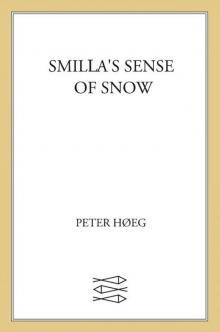 Smilla's Sense of Snow
Smilla's Sense of Snow Borderliners
Borderliners The Susan Effect
The Susan Effect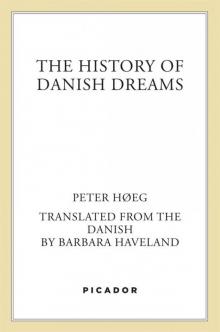 The History of Danish Dreams
The History of Danish Dreams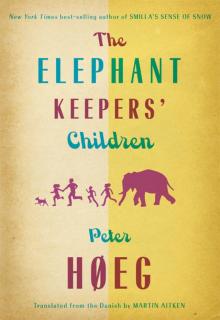 The Elephant Keepers' Children
The Elephant Keepers' Children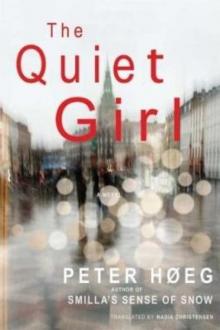 The Quiet Girl - Peter Hoeg
The Quiet Girl - Peter Hoeg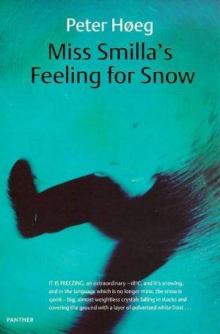 Smilla's Sense of Snow aka Miss Smilla's Feeling for Snow
Smilla's Sense of Snow aka Miss Smilla's Feeling for Snow